

Talmud. The Talmud (/ˈtɑːlmʊd, -məd, ˈtæl-/; Hebrew: תַּלְמוּד talmūd "instruction, learning", from a root lmd "teach, study") is a central text of Rabbinic Judaism.
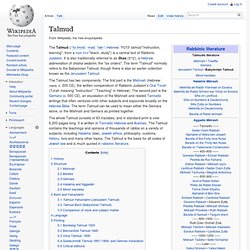
It is also traditionally referred to as Shas (ש״ס), a Hebrew abbreviation of shisha sedarim, the "six orders". Ketuvim. Ketuvim[pronunciation?]
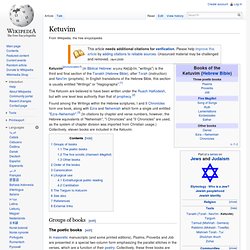
(in Biblical Hebrew: כְּתוּבִים Kəṯûḇîm, "writings") is the third and final section of the Tanakh (Hebrew Bible), after Torah (instruction) and Nevi'im (prophets). In English translations of the Hebrew Bible, this section is usually entitled "Writings" or "Hagiographa".[1] The Ketuvim are believed to have been written under the Ruach HaKodesh, but with one level less authority than that of prophecy.[2] Found among the Writings within the Hebrew scriptures, I and II Chronicles form one book, along with Ezra and Nehemiah which form a single unit entitled "Ezra–Nehemiah".[3] (In citations by chapter and verse numbers, however, the Hebrew equivalents of "Nehemiah", "I Chronicles" and "II Chronicles" are used, as the system of chapter division was imported from Christian usage.)
Collectively, eleven books are included in the Ketuvim. Nevi'im. Nevi'im[pronunciation?]
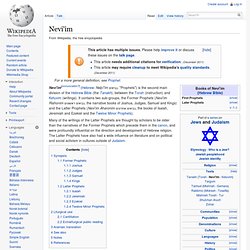
(Hebrew: נְבִיאִים Nəḇî'îm, "Prophets") is the second main division of the Hebrew Bible (the Tanakh), between the Torah (instruction) and Ketuvim (writings). It contains two sub-groups, the Former Prophets (Nevi'im Rishonim נביאים ראשונים, the narrative books of Joshua, Judges, Samuel and Kings) and the Latter Prophets (Nevi'im Aharonim נביאים אחרונים, the books of Isaiah, Jeremiah and Ezekiel and the Twelve Minor Prophets). Many of the writings of the Latter Prophets are thought by scholars to be older than the narratives of the Former Prophets which precede them in the canon, and were profoundly influential on the direction and development of Hebrew religion.
The Latter Prophets have also had a wide influence on literature and on political and social activism in cultures outside of Judaism. Synopsis[edit] In Judaism, Samuel and Kings are each counted as one book. Former Prophets[edit] Joshua[edit] Torah. Torah (/ˈtɔːrə/; Hebrew: תּוֹרָה, "Instruction, Teaching"), or what is often referred to in English as "Pentateuch" (/ˈpɛntəˌtuːk, -ˌtjuːk/), is the central concept in the religious Judaic tradition.
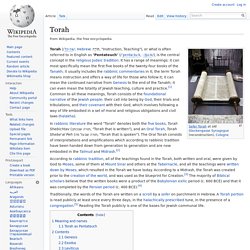
It has a range of meanings: it can most specifically mean the first five books of the twenty-four books of the Tanakh; it usually includes the rabbinic commentaries in it; the term Torah means instruction and offers a way of life for those who follow it; it can mean the continued narrative from Genesis to the end of the Tanakh; it can even mean the totality of Jewish teaching, culture and practice.[1] Common to all these meanings, Torah consists of the foundational narrative of the Jewish people: their call into being by God, their trials and tribulations, and their covenant with their God, which involves following a way of life embodied in a set of moral and religious obligations and civil laws (halakha).
Meaning and names[edit] Torah as Pentateuch[edit] Contents[edit] Genesis[edit] Tanakh. Judaism. Judaism (from the Latin Iudaismus, derived from the Greek Ἰουδαϊσμός, and ultimately from the Hebrew יהודה, Yehudah, "Judah";[1][2] in Hebrew: יהדות, Yahadut, the distinctive characteristics of the Judean ethnos)[3] is the religion, philosophy and way of life of the Jewish people.[4] Judaism is a monotheistic religion, with the Torah as its foundational text (part of the larger text known as the Tanakh or Hebrew Bible), and supplemental oral tradition represented by later texts such as the Mishnah and the Talmud.
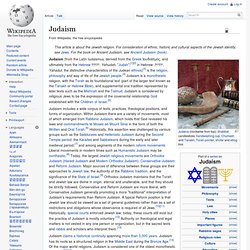
Judaism is considered by religious Jews to be the expression of the covenantal relationship God established with the Children of Israel.[5] Judaism includes a wide corpus of texts, practices, theological positions, and forms of organization. Judaism claims a historical continuity spanning more than 3,000 years. Defining character and principles of faith Defining character Glass platter inscribed with the Hebrew word zokhreinu - remember us Core tenets 13 Principles of Faith: